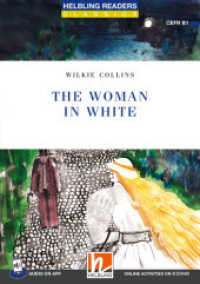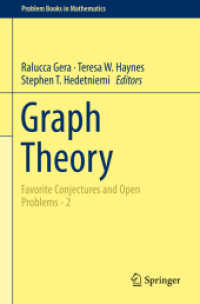- ホーム
- > 洋書
- > 英文書
- > History / World
Full Description
This book presents new aspects of the U.S. Cuba policy during Gerald R. Ford's presidency (August 9, 1974‒January 20, 1977). Based in governmental and other sources from the U.S. and Cuba, the book examines how the Ford administration broke with Nixon's hostile policy when the diplomatic and economic isolation of Cuba was ended in the OAS, even when the U.S. economic blockade prevailed. In line with the detente policy towards the USSR, the Ford administration strived to normalize the relations with Cuba through secret discussions. However, the Cuban involvement in the Angolan civil war ended this process of normalization, and the U.S. returned to a confrontational policy. Within this framework, counterrevolutionary groups in the U.S. could act, more or less with impunity, towards Cuba, but also against Cuban and third-country targets both within and outside the U.S. The book describes the oscillating Cuba policy that was the hallmark of the Ford administration. The Cuban perspective adopted will complement and enrich the knowledge of the U.S. policy toward Cuba during Gerald Ford's presidency. It is of relevance to everyone interested in the issue and especially for students and researchers within the disciplines of History and Political Science.
Contents
Part 1: The Ford Administration Between Continuity and Rupture 1. The U.S. and the Arrival of President Gerald R. Ford 2. U.S. Foreign Policy and the Break with Nixon's Cuba Policy 3. The "New Dialogue" and the Failure of the Regional Isolation of Cuba Part 2: Cuba's Domestic Transformations and International Perspectives (1974-1976) 4. Domestic Politics in Cuba (1974-1976) 5. Cuba's Foreign Policy Between 1974 and 1976 6. The U.S. Congress and the Cuba Policy Part 3: The Secret Talks Between the U.S. and Cuba 7. The Beginning and the Development of Secret Conversations 8. The Meeting at Hotel Pierre9. From a Warm Summer to a Chilly Autumn Part 4: The Impact of the Cuban Mission in Angola 10. The Civil War in Angola and the Covert Participation of the U.S. 11. The Cuban Support and the Independence of Angola 12. The Defeat of the Invaders and the Punishment of Cuba Part 5: The Conservative Offensive in Latin America and the Cuban Counterrevolution 13. The Reactionary Wave in Latin America 14. Actions by Terrorist Organizations of Cuban Origin (1974-1975) 15. Counterrevolutionary Terrorism in 1976







